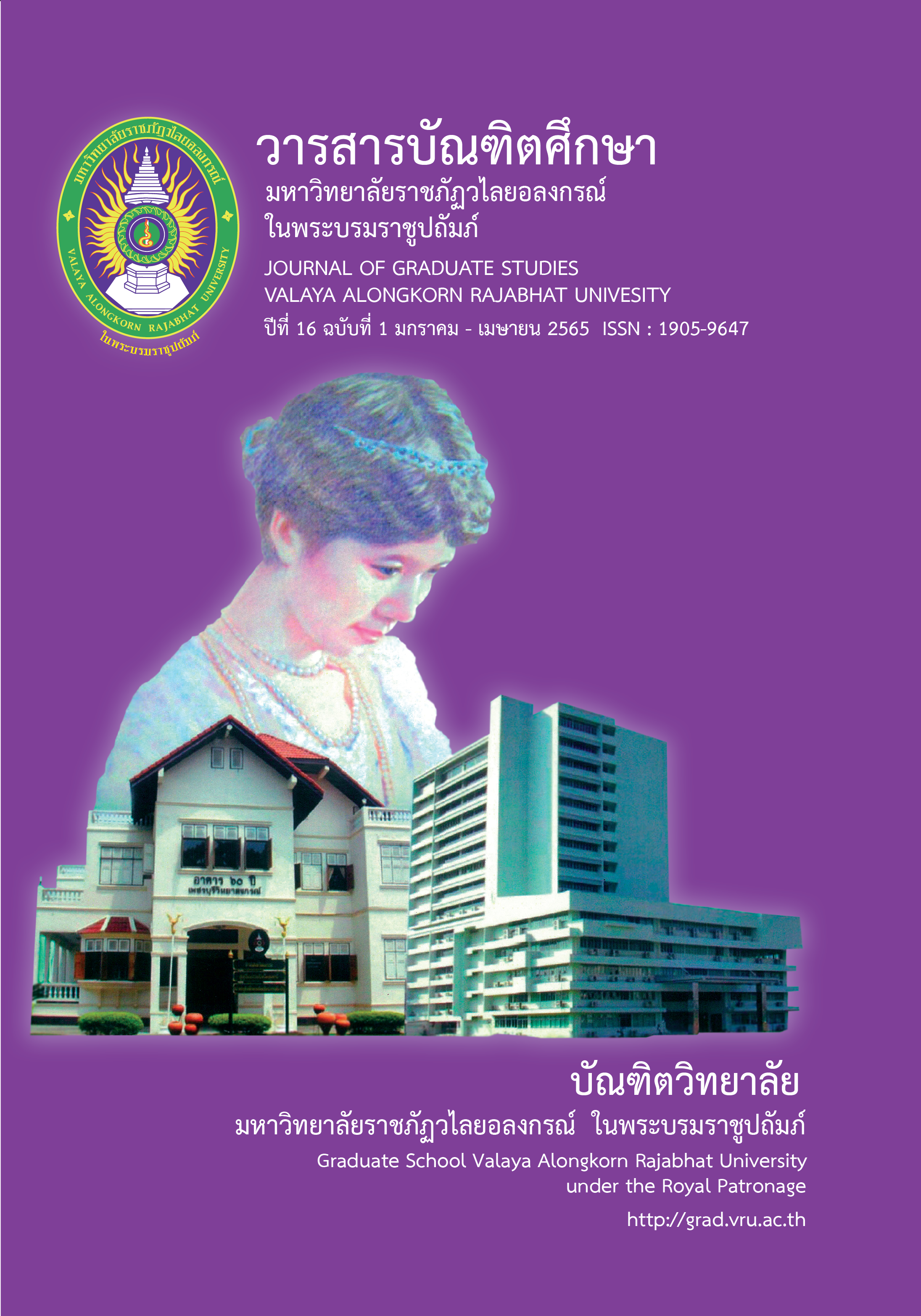POTENTIAL OF ACCOMMODATION DEVELOPMENTS IN CHIANG KHAN DISTRICT TO REINFORCE SUSTAINABLE CIVILIZATION ALONG MEKONG RIVER IN APPROACHING ASEAN COMMUNITY
Main Article Content
Abstract
This mixed method research integrated with the qualitative and quantitative approach has aimed to study 1) the scenario of accommodation management, problems and threats in Chiang khan district, 2) the expectations and perceptions in development potential of accommodation management in Chiang khan district, Loei province, and 3) exploratory factor analysis in strategic potential development of accommodation management in Chiang khan district to reinforce sustainable of civilization along Mekong River in approaching the ASEAN community. In quantitative method, the 10 persons from accommodation’s entrepreneurs, experts in tourism and marketing management and tourists were collected data and the quantitative method, the 450 tourists who visiting in Chiang Khan Area were used to gather data. The semi-structural interview and 5 scaled questionnaires were carried out as research tools. The analyzing of quantitative study has implemented Frequency, Percentage, Mean, Standard Deviation (S.D.) and Exploratory Factor Analysis.
The research findings revealed that: 1) the most recent of accommodations’ management is a family business which has a major problem with the limitation of area where it is unable to be expanded. 2) The studying in accommodation guests’ expectations found that it is in high level ( = 4.38, S.D. 0.25) and their perceptions are also in high level (
= 3.91, S.D. 0.32). And 3) the results of exploratory factor analysis in strategic potential development of accommodation management in Chiang khan district have comprised of (1) accommodation employee’s hospitality, (2) accommodation comfortability, (3) various of servicing processes, (4) unique in leisure atmospheres, (5) continued promotions in niche group and (6) pricing perceptions. According to overall factors are able to explain to the variance of accommodation’s strategic potential development in Chiang khan district at 79.351 percent.
Article Details

This work is licensed under a Creative Commons Attribution-NonCommercial-NoDerivatives 4.0 International License.
บทความทุกเรื่องได้รับการตรวจความถูกต้องทางวิชาการโดยผู้ทรงคุณวุฒิ ทรรศนะและข้อคิดเห็นในบทความ Journal of Global of Perspectives in Humanities and Social Sciences (J-GPHSS) มิใช่เป็นทรรศนะและความคิดของผู้จัดทำจึงมิใช่ความรับผิดชอบของบัณฑิตวิทยาลัย มหาวิทยาลัยราชภัฏวไลยอลงกรณ์ ในพระบรมราชูปถัมภ์ กองบรรณาธิการไม่สงวนสิทธิ์การคัดลอก แต่ให้อ้างอิงแหล่งที่มา
References
Chiangkhan. (2018). thanon khon dœ̄n [Walkingstreet]. Retrieved from https://chiangkhanwalkingstreetloei.wordpress.com/
Chubchuwong, M. (2019). talāt rōngrǣm. [Hotel Marketing]. Bangkok: Chulalongkorn University Press.
Franco, M & Meneses, R. (2020). The Influence of Culture in Customers' Expectations about the Hotel Service in Latin Countries with Different Human Development Levels. European Journal of Tourism Hospitality and Recreation. 10(1), 56-73. DOI: https://doi.org/10.2478/ejthr-2020-0005
Gorsuch, R. L. (1983). Factor Analysis. 2nd ed. New Jersey: Lawrence Erlbum Associates, Hilldale.
Kerlinger, F. N. (1986). Foundations of Behavioral Research (3rd ed). USA: Hort, Rinehart and Winson.
Khemthong, S. (2016). konlayut kānčhatkān læ kāntalāt samrap thurakit rōngrǣm [Strategic Management and Marketing for Hotel Business]. Nonthaburi: The Office of the University Press Sukhothaithammathirat Open University.
Khemthong, S. (2015). kān pen phūprakō̜pkān thurakit rōngrǣm khanāt yō̜m læ kānčhatkān thī phak thāng lư̄ak nūai thī sō̜ng [Entrepreneurship in small hotel business and alternative accommodation management]. Unit 2. Nonthaburi: The Office of the University Press Sukhothaithammathirat Open University.
Knapp, T. R. & Brow, J. K. (1995). Ten Measurement Commandments That Often Should Broke. Research in Nursing & Health. 47(4), 456-469.
Kosol, O. & Suttawet, C. (2013). kānčhatkān dān kānthō̜ngthīeo yāng yangyư̄n phư̄a rō̜ng rap kān khao sū prachākhom sētthakit ʻĀsīan [Sustainable Tourism Management for Supporting ASEAN Economics Community]. Journal of Politics and Governance. 4(1). 220-232.
Ounsri, K., & Thawesaengskulthai, N. (2019). Hotel Service Quality Factors among Different Cultures. 2019 IEEE 6th International Conference on Industrial Engineering and Applications (ICIEA). DOI: 10.1109/IEA.2019.8715145
Sanglimsuwan, K. (2012). kānthō̜ngthīeo chœ̄ng mō̜radok thāng watthanatham yāng yangyư̄n. [Sustainable Cultural Heritage Tourism]. Executive Journal. 32(4), 139-146.
Sangpikul, A. (2015). ʻēkkasān prakō̜p kānsō̜n chut wichā kān pen phūprakō̜pkān thurakit rōngrǣm khanāt yō̜m læ kānčhatkān thī phak thāng lư̄ak nūai thī čhet konlayut kāntalāt samrap thurakit rōngrǣm khanāt yō̜m læ thī phak thāng lư̄ak [Entrepreneurship in Small Hotel Business and Alternative Accommodation Management. Unit 7 Marketing Strategy for Small Hotel Business and Alternative Accommodation]. Nonthaburi: The Office of the University Press Sukhothaithammathirat Open University.
Seyanon, A. & Sompopsakul, P. (2010). kānraprū khrư̄angmư̄ kānsư̄sān kāntalāt thī mī phon tō̜ kānthō̜ngthīeo nai talātnam ʻAmphawā čhangwat samut songkhrām [Perception Integrated Marketing Communication Influencing to Tourism at Amphawa Floating Market Samut Songkram Province]. Bangkok: Bangkok University.
Sophonsiri, S. (2011). kān wikhro̜ phrưttikam nakthō̜ngthīeo [Tourist Behavior Analysis]. Bangkok: Intanin.
Srisa-Ard, B. (2017). kānwičhai bư̄angton [The Basic of Research]. (10th ed). Bangkok: Suweeriyasan.
Submonchai, S. & Phadoongsitthi, M. & Rompho, N. (2013). kānwičhai thāng thurakit [Business Research]. Bangkok: Physicscenter.
Sukhanthasirikun, G. (2015). rāingān kānwičhai rư̄ang kānphatthanā sakkayaphāp kāntalāt bō̜rikān khō̜ng hōmsatē thī dai raprō̜ng māttrathān nai čhangwat Nakhō̜n Rātchasīmā [The Development of the Market Potential of Homestay Services that have been Standardized in Nakhon Ratchasima]. Nakhon Ratchasima: Suranari University of Technology.


